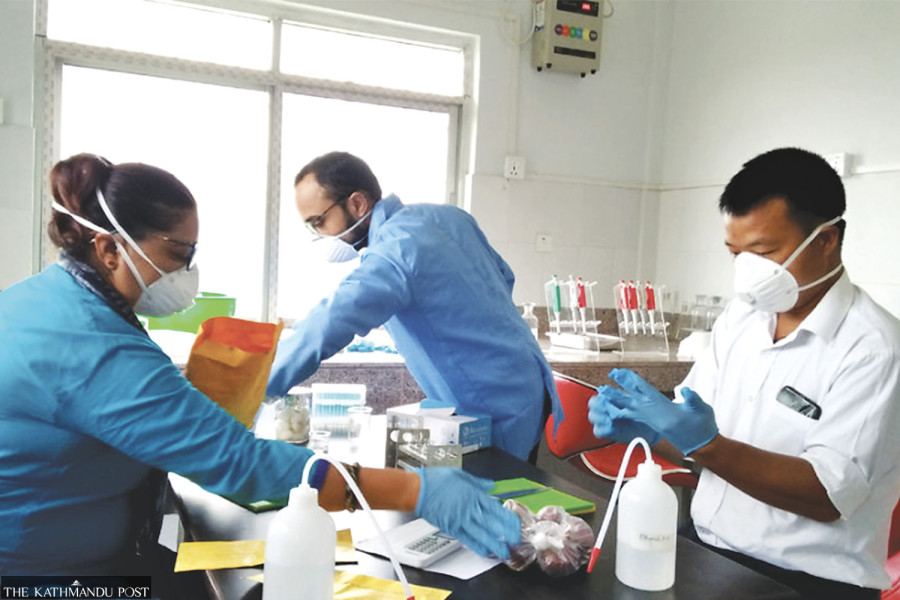Money
Nepali food lab gets global nod for 814 parameters
International accreditation boosts Nepal’s capacity to test food exports, easing global trade and paving the way for wider market access.
Post Report
In a move to boost Nepal’s food exports, the National Food and Feed Reference Laboratory (NFFRL) under the Department of Food Technology and Quality Control has received international accreditation for testing 814 parameters related to food safety and quality in 2025.
The National Accreditation Board for Testing and Calibration Laboratories (NABL) of India, which holds international recognition, has accredited the NFFRL’s certificate of analysis. This year, the laboratory was certified for both chemical and microbiological parameters across all major food categories.
NFFRL’s journey toward global recognition began in 2012 with the accreditation of 27 chemical parameters. The scope expanded in 2015 to include 22 chemical and 17 microbiological parameters, and further widened in 2019 with the inclusion of 78 chemical and 24 microbiological parameters. With the latest accreditation, the laboratory now covers 814 parameters, significantly enhancing its capacity and credibility.
Food parameters refer to the physical, chemical, and microbiological characteristics that determine a food product’s safety, quality, and nutritional value. These parameters apply across a wide range of food groups including milk and dairy products, fats and oils, cereals, fruits and vegetables, and meat products. For example, in the case of dairy, parameters include tests for moisture content, pesticide residues, essential oils, and heavy metals.
“We have expanded the scope of our accreditation significantly this year,” said Mohan Krishna Maharjan, spokesperson for the department. “Previously, the limited number of accredited parameters meant limited recognition. With broader accreditation, international recognition also increases, which in turn facilitates trade.”
According to Maharjan, the lab can now issue internationally accepted reports for 814 parameters, enabling Nepali food producers to meet global standards. The current accreditation is valid until April 31, 2027, after which it can be renewed or extended further to additional food products.
The department is also working toward securing specific accreditation to export food products to India. “We’ve requested our Indian counterpart to provide accreditation covering 22 food product groups,” Maharjan said.
This development is expected to support the export of various Nepali agricultural products, including processed fruits and vegetables, instant noodles, honey, ghee, pickles, spices, grains, dog chew treats, and pet foods.
Despite India’s formal recognition of NFFRL’s certification in April, exporters say practical implementation remains inconsistent. India’s Food Safety and Standards Authority officially accepted eight specific product categories—juice, jam, jelly, pickles, candies, ginger, fresh fruits and vegetables, and instant noodles—for testing at NFFRL and clearance through Indian customs. But challenges persist.
“Although India has recognised the lab on paper, we are still facing difficulties in exporting noodle products,” said Mahesh Jaju, managing director of Asian Thai Foods and Asian Biscuits and Confectionery, which produces popular noodle brands like Rum Pum and 2PM. “We still need to rely on Indian labs for certification, which adds cost and delays due to expensive lab fees and logistical hurdles.”
Jaju noted that while exports to third countries proceed smoothly using NFFRL-certified reports, India remains an outlier. His company is now applying for NFFRL-issued reports for Indian exports, hoping the practical barriers will ease soon.
Prahlad Dahal, president of the Nepal Dairy Association, highlighted the broader benefits of international lab recognition. “It’s not just about big companies—this accreditation helps small exporters too,” he said. “They no longer need to send samples abroad, which saves time, lowers costs, and reduces bureaucratic hassle.”
Experts also noted that the expanded accreditation could curb inefficiencies and corruption in the export process. Previously, exporters often had to work through agents who charged hefty fees to get lab tests and register products in their own names. These middlemen added to logistical delays and inflated costs.
Nepal has applied for accreditation across 22 food groups, which include: Milk and milk products, edible fats and oils, vegetables and vegetable products, fruits and fruit products, herbs, spices and condiments, edible salts, honey and honey products, cereals, pulses, and cereal products, bakery and confectionery items, infant foods, tea and tea products and meat and meat products.
Other categories include alcoholic and non-alcoholic beverages, bottled water, nuts and nut products, dietary supplements, nutraceuticals and functional foods, animal foods and feeds, as well as specialty items such as gelatin, bubble gum, and chewing gum.
With international accreditation now in place, Nepal’s food industry has a better foundation to compete in global markets. The next challenge lies in ensuring that these recognitions are implemented in practice, especially with key trading partners like India.




 14.12°C Kathmandu
14.12°C Kathmandu












